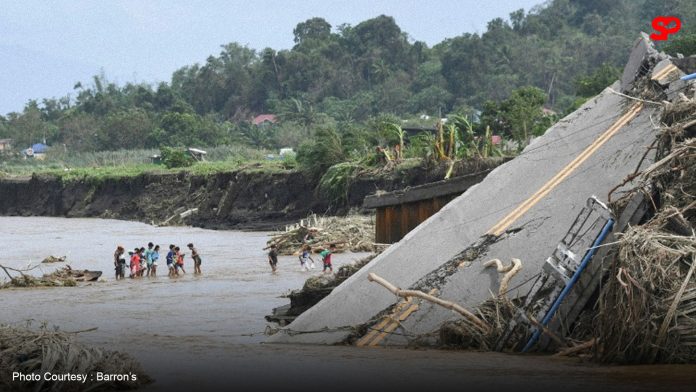By Michelle Ducut
The PhP 61 billion flood control project for the Bicol Region has recently gained renewed attention due to growing concerns over its inefficiency, potential mismanagement, and mounting allegations of corruption. The project was initially part of a larger national initiative to safeguard vulnerable regions, such as Bicol, from the devastating impact of natural disasters like typhoons and floods. Despite the massive budget allocations, the Bicol Region continues to suffer from extreme flooding, most notably brought to the forefront during the aftermath of Typhoon Kristine.
Typhoon Kristine, which recently battered parts of Bicol, further underscored the urgency of flood control infrastructure in the region. Several areas, including Naga City, Albay, and Sorsogon, were severely affected by flooding, forcing thousands of families into evacuation centers. The storm’s devastation raised critical questions regarding the efficacy of the PhP 61 billion flood control efforts—questions that both local leaders and national policymakers have begun to ask with greater intensity.
Senate President Chiz Escudero, alongside Senators Joel Villanueva and Alan Peter Cayetano, has been vocal about the need to investigate where these substantial funds have gone. They pointed out that despite the billions allocated to flood control under the Department of Public Works and Highways (DPWH), communities in Bicol and other flood-prone areas remain highly vulnerable during typhoon season. In 2024 alone, the DPWH was given PhP 255 billion for flood control nationwide, yet the results, especially in Bicol, continue to disappoint.
Escudero emphasized the need for transparency and accountability, citing that many projects appear incomplete or ineffective. Recent reports indicate that corruption may have played a role in the misallocation of funds, with infrastructure projects either delayed or poorly constructed, leaving communities in the path of destruction from the seasonal typhoons that routinely affect the region.
The Bicol Region’s susceptibility to typhoons and flooding makes this issue more than just a matter of poor governance—it’s a question of survival for its residents. Year after year, Bicol faces the brunt of tropical cyclones, making flood mitigation projects critical for the region’s safety. The failure to deliver tangible improvements has left local governments frustrated, with residents wondering how billions in taxpayer money have seemingly vanished without improving their situation.
Calls for a comprehensive audit of the flood control projects in Bicol have grown louder. Experts argue that only a full-scale investigation into how these projects have been implemented, and where the funds have gone, will provide answers. Some have also suggested that mismanagement in flood control projects is not unique to Bicol, but part of a larger systemic issue within the DPWH and related agencies. Corruption is a recurring theme, with many believing that portions of the budget are siphoned off, leading to substandard infrastructure that fails to serve its intended purpose.
Moving forward, the government will need to take decisive action to restore public confidence in these projects. Auditing the funds, ensuring greater transparency, and holding accountable those responsible for any misuse of resources will be critical steps in ensuring that flood control efforts in Bicol—and across the nation—can truly protect communities from the increasing threats posed by climate change and natural disasters. While the PhP 61 billion allocated for Bicol’s flood control is a staggering sum, it will amount to little if it continues to fail the people it is supposed to protect.
The aftermath of Typhoon Kristine, which left countless Bicolanos displaced and vulnerable, serves as a grim reminder that the clock is ticking. The real challenge for the government is to turn funding into functional, life-saving infrastructure before the next storm hits. Otherwise, the cycle of devastation will only continue, with the people of Bicol paying the price for the system’s shortcomings.

